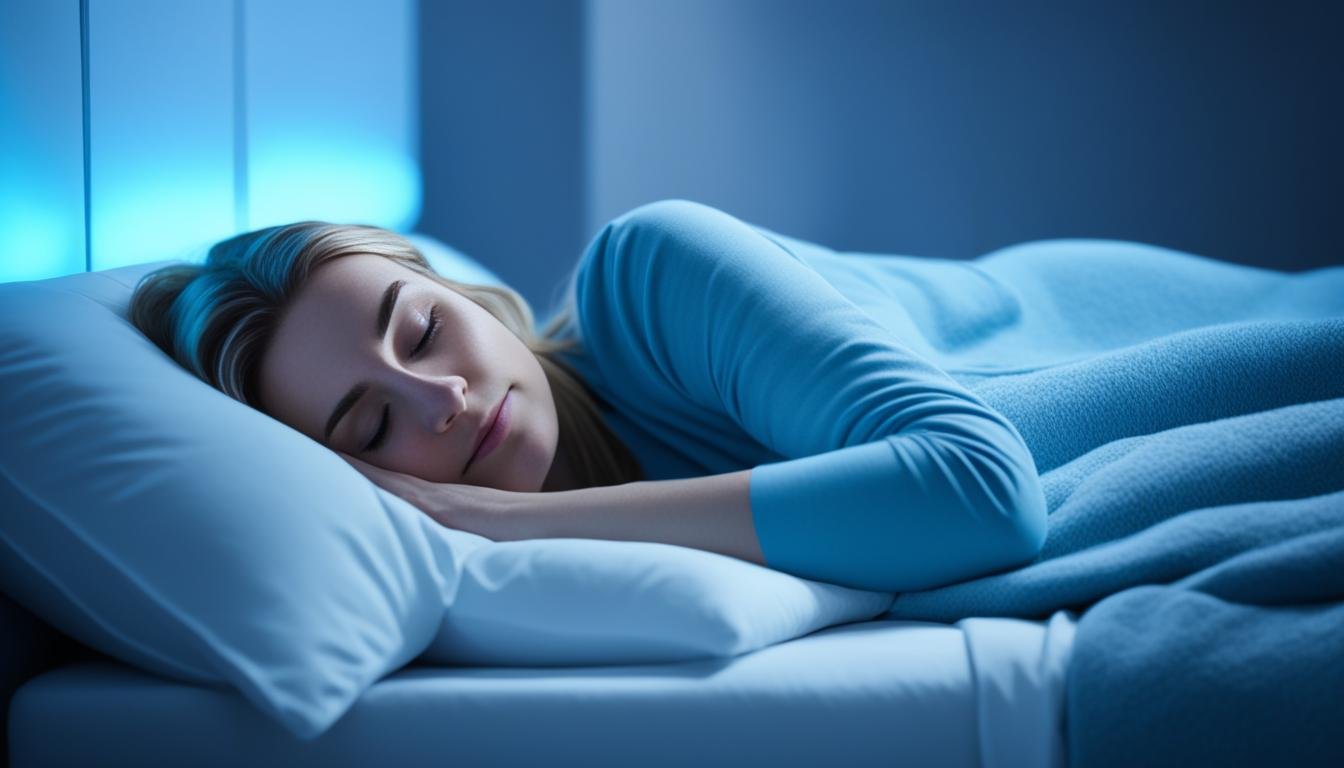Sleep is key to staying healthy. Not getting enough sleep can lead to serious health issues like heart disease, stroke, obesity, and dementia. Dr. Marishka Brown, an expert on sleep, says there are three main things for good sleep: getting enough rest, having sleep without interruptions, and sticking to a regular sleep schedule.
But, things like odd work hours and too much stress can make it hard to sleep well.
Key Takeaways:
- Getting enough sleep is essential for overall health and well-being.
- Having uninterrupted and refreshing sleep is crucial for optimal health.
- Maintaining a consistent sleep schedule promotes better sleep quality.
- Irregular work schedules and high levels of stress can negatively impact sleep quality.
- Improving sleep quality can reduce the risk of various diseases and disorders.
Understanding the Benefits of Sleep
Sleep is key to our health and happiness. It helps our bodies and minds work right. By making sleep a priority, we can feel better and live longer.
Good sleep helps our brains work better. It makes memory stronger and learning easier. It also boosts focus, creativity, and solving problems, making us do better in all we do.
Sleep keeps our immune system strong. A good night’s rest helps fight off sickness. It also helps us heal faster from injuries or sickness.
Quality sleep is good for our feelings and minds. Not sleeping well can make us stressed, moody, anxious, or depressed. Better sleep habits lead to a happier mood and less stress.
Sleep is also good for our bodies. It helps us stay at a healthy weight. Not sleeping enough can make us eat more and choose unhealthy foods.
Sleep affects our body’s natural rhythm. It helps us feel rested and ready for the day. Keeping a regular sleep schedule improves sleep quality and keeps our bodies working right.
Quality sleep offers many benefits. It’s important to focus on getting better sleep, keeping a regular sleep schedule, and good sleep habits. Simple steps like a regular sleep schedule, a comfy sleep space, and avoiding screens before bed can make a big difference. They help us feel better physically, mentally, and emotionally.
Common Sleep Myths and Truths
There are many wrong ideas about sleep that can confuse us. Let’s clear up some common sleep myths and find the truth.
Myth: Sleep requirements decrease with age
Many think we need less sleep as we get older. But, our sleep needs stay about the same as adults. Most adults still need 7-9 hours of sleep each night to be fully healthy.
Myth: “Catching up” on sleep during weekends is effective
Some think sleeping more on weekends can make up for lost sleep during the week. But, research shows this doesn’t work well. It’s better to focus on good sleep every night.
Myth: Medication is a reliable treatment for insomnia
Medicine might help with insomnia for a little while, but it’s not a long-term fix. It doesn’t solve the real reasons for insomnia. Using sleep aids too much can lead to addiction and side effects. A better way is to use sleep hygiene, relaxation methods, and cognitive behavioral therapy for insomnia (CBT-I).
Myth: Napping is always beneficial for sleep-deprived individuals
Napping can help with tiredness, but it’s not good for everyone. Long or late naps can mess up your sleep at night and make insomnia worse. People with sleep disorders like sleep apnea should avoid napping too.
| Myth | Truth |
|---|---|
| Sleep requirements decrease with age | Sleep needs remain relatively constant throughout adulthood |
| “Catching up” on sleep during weekends is effective | Consistency and prioritizing quality sleep are more beneficial |
| Medication is a reliable treatment for insomnia | Comprehensive approaches like CBT-I are more effective |
| Napping is always beneficial for sleep-deprived individuals | Napping should be balanced and considered based on individual needs |
Knowing and clearing up these sleep myths helps us make better choices for better sleep and health. Staying consistent, valuing good sleep, and trying proven treatments like cognitive behavioral therapy for insomnia (CBT-I) can lead to better nights and mornings.
Understanding Sleep Disorders
Sleep disorders can greatly affect our health and well-being. They can mess up our sleep quality and amount. This leads to physical and mental problems. Insomnia and sleep apnea are two common sleep disorders many face.
Insomnia: Difficulty Falling and Staying Asleep
Insomnia makes it hard to fall asleep or stay asleep. It can be short-term or last a long time. People with insomnia often lie awake in bed, unable to sleep well.
Insomnia can be caused by stress, anxiety, depression, certain medicines, or health issues. Not sleeping well can make you tired, hard to concentrate, and affect your mood. This can make daily life and overall health suffer.
Sleep Apnea: Breathing Interruptions during Sleep
Sleep apnea is a disorder where breathing stops during sleep. It happens when the airway partly or fully blocks. This leads to waking up many times during the night, making sleep poor.
There are three types of sleep apnea: obstructive, central, and complex sleep apnea syndrome. The most common is obstructive sleep apnea. It happens when the throat muscles relax, narrowing or blocking the airway. This causes loud snoring, gasping for air, and feeling very tired during the day.
To deal with sleep disorders, seeing a healthcare provider who knows about sleep medicine is key. They can check you out, suggest tests, and create a plan just for you.
Tips for Improving Sleep
Getting good sleep is key for feeling well. Adding certain habits to your day can make your sleep better. Here are some tips to help you sleep well at night:
1. Stick to a Consistent Sleep Schedule
Having a regular sleep schedule helps your body get into a rhythm. Try to go to bed and wake up at the same time every day, even on weekends. This makes it easier to sleep well and feel refreshed.
2. Avoid Napping
A short nap might seem good, but it can mess with your night sleep. If you’re having trouble sleeping, try not to nap or keep it very short.
3. Create a Relaxing Bedtime Routine
Doing calming things before bed tells your body it’s time to sleep. You could read a book, take a warm bath, or do some gentle stretches. Try different things to see what helps you relax best.
4. Set Up a Sleep-Friendly Environment
Creating a sleep-friendly space can help you sleep better. Make sure your bedroom is cool, quiet, and dark. Use blackout curtains, earplugs, or a white noise machine if needed. Choose a comfy mattress and bedding for a cozy sleep space.
5. Limit Stimulants and Alcohol Before Bedtime
Stay away from caffeine, nicotine, and alcohol before bed. These can make it hard to fall asleep and stay asleep. Instead, have a calming tea or warm milk to relax.
6. Incorporate Physical Activity into Your Day
Exercise can improve your sleep. Doing moderate exercise during the day makes you feel tired and ready for sleep. Just don’t exercise too close to bedtime, as it can keep you awake.
Using these tips can make your sleep better, helping you wake up feeling refreshed. Remember, being consistent and having a calming bedtime routine are important for good sleep.
| Tips for Improving Sleep | |
|---|---|
| Stick to a Consistent Sleep Schedule | Establish a regular sleep schedule to regulate your body’s internal clock. |
| Avoid Napping | Limit daytime napping to ensure it doesn’t interfere with nighttime sleep. |
| Create a Relaxing Bedtime Routine | Engage in activities that promote relaxation before bedtime. |
| Set Up a Sleep-Friendly Environment | Create a cool, dark, and quiet sleep environment for optimal sleep quality. |
| Limit Stimulants and Alcohol | Avoid substances that can disrupt sleep, such as caffeine and alcohol. |
| Incorporate Physical Activity | Include regular exercise in your daily routine to improve sleep quality. |
Benefits of Cognitive Behavioral Therapy for Insomnia (CBT-I)
Cognitive Behavioral Therapy for Insomnia (CBT-I) is the top choice for sleep issues. It focuses on changing behaviors and can greatly improve sleep quality. Simple steps like setting a regular sleep schedule and avoiding too much time in bed are key parts of CBT-I. These changes help build better sleep habits over time.
CBT-I tackles the main causes of insomnia with a full approach. It helps people spot and fight negative thoughts that make sleep hard. By changing these thoughts, people can worry less about sleep and feel less anxious. This makes it easier to fall asleep and stay asleep all night.
CBT-I also teaches skills for handling stress and relaxing, which are key for good sleep. Studies show it’s a lasting solution for insomnia, unlike sleep drugs. It teaches patients to make lifestyle changes that stick, leading to better sleep and overall health.
The Benefits of CBT-I:
- Highly effective in treating chronic insomnia
- Promotes healthier sleep habits
- Reduces reliance on sleep medication
- Addresses the underlying causes of sleep difficulties
- Improves overall well-being and quality of life
If you’re having trouble sleeping, think about talking to a therapist who knows about CBT-I. They can help you with strategies that fit your sleep issues. Remember, good sleep is key for your health, and CBT-I can help you sleep better at night.
Expert Tips for Better Sleep
Sleep is key to our health and happiness. If you’re having trouble sleeping, adding some expert advice to your routine can help. Psychiatrist Jesse Koskey offers tips to improve your sleep and boost your health.
Sleep When You’re Sleepy
“The first tip I always share with my patients is to sleep only when you’re truly sleepy,” says Dr. Koskey. “Try not to force yourself to sleep if you’re not feeling tired. This way, you can improve your body’s natural sleep-wake rhythm and avoid tossing and turning in bed.”
Avoid Long Daytime Naps
Long naps during the day can mess up your sleep schedule. Instead, keep your naps short, 20-30 minutes, to refresh you without affecting your night’s sleep.
Engage in Regular Physical Activity
Exercise can help you sleep better. Doing aerobic exercises like walking or jogging for 30 minutes daily can make your sleep better and longer.
Create a Restful Sleep Environment
How you sleep affects your sleep quality. Dr. Koskey says make your sleep area calm and dark. Use blackout curtains, earplugs, or a white noise machine to block out noise or light.
Limit Caffeine, Nicotine, and Alcohol Intake
Drinking caffeine, nicotine, and alcohol before bed hurts your sleep. These substances keep you awake. Try to avoid them for a few hours before bedtime.

Manage Worries and Stress
Stress can make sleeping hard. Dr. Koskey recommends relaxation techniques like deep breathing, meditation, or journaling to ease stress before bed. Adding these to your bedtime routine helps signal your body to relax for better sleep.
Using these expert tips can improve your sleep habits and quality. They can help you sleep better every night.
Conclusion
Improving sleep quality is key for better health and happiness. Simple steps and healthy habits can make sleep better. By sticking to a regular sleep schedule and relaxing before bed, you can sleep better.
Some sleep issues might need a doctor’s help. But, using relaxation techniques and healthy sleep habits can help a lot. Seeing sleep as important helps your overall health and daily life. It boosts productivity and improves your physical and mental health.
Try these tips now and see how better sleep changes your life. A good night’s sleep means waking up refreshed and ready for the day. Sweet dreams!

